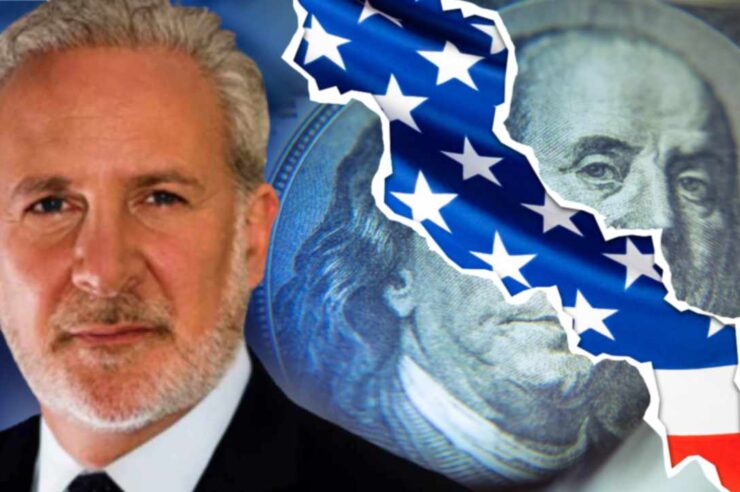Economist Peter Schiff has predicted that the U.S. Federal Reserve will ultimately throw in the towel on its inflation fight to confront “something it fears even more, which is a complete economic collapse, another financial crisis, or a sovereign debt crisis.” He stressed, “The months of declining inflation are in the review mirror,” emphasizing that now “we’re going to see accelerating inflation.”
Peter Schiff on Potential Economic Collapse
Economist and gold bug Peter Schiff shared some dire warnings about where the U.S. economy is headed and the consequences of the Federal Reserve’s fight against inflation in an interview with Greg Hunter on the USAWatchdog show, published Saturday.
Citing recent economic data, including the personal consumption expenditures price index which rose 0.6% in January, Schiff said: “The months of declining inflation are in the review mirror. And now we’re going to see accelerating inflation as measured by these government indexes.”
Asserting that the Federal Reserve’s inflation fight has been completely ineffective, the economist opined:
If the Fed is serious about fighting inflation, which I don’t believe it is, but if it were serious, it’s going to have to fight a lot harder than it has. Rates need to go up much more than anybody thinks.
However, Schiff said higher interest rates alone will not be sufficient. “We also have to see a big contraction in consumer credit. We need to see lending standards rising so consumers can’t keep spending,” he described. “People are spending money. They’re running up more credit card debt. That is inflationary … We need consumers to stop spending.” The economist stressed that people need to be working, producing, and saving — not spending.
Moreover, Schiff emphasized that the federal government needs to get its spending problem under control. He detailed:
We need significant cuts in government spending. The government can’t just give people money to spend, because that’s what’s bidding up these prices. And ultimately, they’re going to force the Fed back to quantitative easing.
Schiff predicted that ultimately the Fed is going to throw in the towel on its inflation fight, adding:
Because it’s going to be fighting something it fears even more, which is a complete economic collapse, another financial crisis, or a sovereign debt crisis.
He additionally warned that the Fed may even force the U.S. government to consider legitimately cutting Social Security and Medicare “as opposed to just illegitimately cutting it by creating inflation.”
The economist has previously cautioned that the Fed’s action could cause a financial crisis and a much more severe recession than the central bank recognizes. He also recently predicted that inflation is about to get much worse and the U.S. dollar will crash.
What do you think about Peter Schiff’s economic collapse prediction? Let us know in the comments section below.
Image Credits: Shutterstock, Pixabay, Wiki Commons
Disclaimer: This article is for informational purposes only. It is not a direct offer or solicitation of an offer to buy or sell, or a recommendation or endorsement of any products, services, or companies. Bitcoin.com does not provide investment, tax, legal, or accounting advice. Neither the company nor the author is responsible, directly or indirectly, for any damage or loss caused or alleged to be caused by or in connection with the use of or reliance on any content, goods or services mentioned in this article.
Read disclaimer




